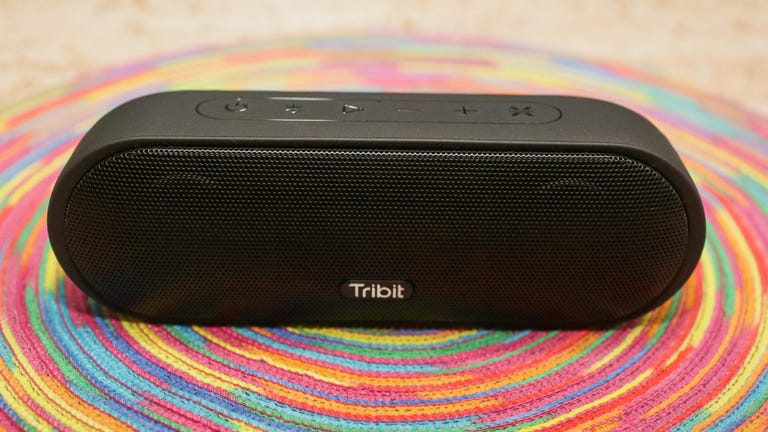 Why You Can Trust CNET
Why You Can Trust CNET Tribit MaxSound Plus review: A small Bluetooth speaker grows up but maintains its value
The MaxSound Plus, the bigger version of Tribit's highly rated XSound Go speaker, pumps out richer sound for a little more than $50.
Last year I gave high marks to Tribit's XSound Go waterproof portable Bluetooth speaker, which sounded impressive for its small size and also had a decent design.
The Good
The Bad
The Bottom Line
That model's still around -- and is still a very good deal at a little more than $30 -- but now it has a big brother, the Tribit MaxSound Plus, which retails for $56 in the US and £56 in the UK. (It doesn't yet appear to be available in Australia, but the price converts roughly to AU$80.)
It looks very similar to the XSound Go, with the same rounded corners, but the MaxSound Plus looks to be about 30 percent larger and weighs 21 ounces (595 grams) to the XSound Go's 13.4 ounces (380 grams). This model is also IPX7 certified, which means it's fully waterproof and can be submersed in up to 3 feet (1 meter) of water for up to 30 minutes. We gave it a dunk and it survived.
The smaller XSound Go (left) compared to the MaxSound Plus (right).
Aside from its larger size, the MaxSound Plus has one small design change worth mentioning: The Tribit logo has been shrunk to a tasteful size. Needless to say, the large white lettering on the grill of the XSound Go looks a little garish.
As you might expect, the speaker's larger size -- and larger drivers -- help it produce bigger sound with more bass. Tribit lists the XSound Go as a 12-watt speaker while the MaxSound Plus gets a 24-watt spec. It has speakerphone functionality along with an extra bass button that rounds out the bass with a little more thump. You'll probably want to leave the bass boost on at all times, so it's a little silly that there's even a button for it, but it's one of those marketing gimmicks that companies like and apparently consumers fall for.
There's a fairly substantial jump in sound quality from the XSound Go to the MaxSound Plus. The new speaker just sounds more even and well balanced and doesn't strain to produce adequate bass. I say adequate because these compact speakers can only produce so much bass. In other words, don't expect the MaxSound Plus' bass to rattle the walls of your home. It can go deeper than the XSound Go, but it can't go that deep. (I don't want to raise your expectations too much).
With the smaller XSound Go, more rock-oriented tunes like The Smashing Pumpkins' "Silvery Sometimes (Ghosts)" sound a little thin and don't come across so well. But listening to the same song on the MaxSound Plus you more apt to say to yourself, "Well, that sounds all right."
The MaxSound Plus adds a bass boost button (right). It also has speakerphone functionality.
The same goes for the baseline on The Police's "Tea in the Sahara" track. It seems restrained coming out of the XSound Go. But on the MaxSound Plus the bass has enough definition to sound like it's being produced by a bass guitar (you can visualize the instrument).
I've tested a few other so-called no-name speakers in this price class -- like the Tronsmart 40W Bluetooth speaker -- which can be had on Amazon for $50. It actually put out bigger sound than the MaxSound Plus but its bass got a little muddy at higher volumes and warbled (distorted) with some of our test tracks, proving that bigger doesn't always mean better.
Battery life for the MaxSound Plus is rated at 20 hours at moderate volumes levels. That's not quite as good as the XSoundGo's battery life (24 hours), but it's still quite good. It charges via a Micro-USB connection -- I'd like to see USB-C -- and there's also an audio input for wired connections for devices that don't support Bluetooth. The speaker takes 4 hours to fully charge or double the time of the XSound Go.
Yes, it's waterproof.
Yes, the MaxSound Plus is about $25 more than the XSound Go and does weigh more. But in my book the sound quality advantage outweighs the size and price advantages. This can fill a small room with sound and seems pretty durable for on-the-go use.
You have compact waterproof speakers from name brands like UE and JBL that also deliver good sound for their size. But the JBL Flip 4 costs around $75 (the Flip 5 is coming soon) and the chunkier UE Wonderboom is also around that price. The UE Boom 3 can be had online for around $125. The MaxSound Plus seems like the better value.
It's worth mentioning that the engineer who designed the speaker reportedly once worked at Harman (which now owns JBL). Alas, word is he's left Tribit to start his own company, so this may be the last good speaker Tribit produces. But I hope I'm wrong about that.


